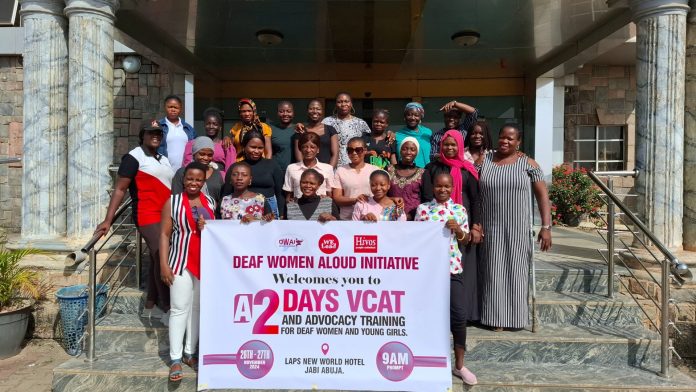As part of the global campaign to mark the 2024 Sixteen Days of Activism Against Sexual and Gender-Based Violence (SGBV), the Deaf Women Aloud Initiative (DWAI) organized an impactful two-day workshop in the Federal Capital Territory (FCT). The training brought together Deaf women to address critical issues around sexual and reproductive health and rights (SRHR), advocacy, and gender-based violence (GBV).
The workshop was a powerful response to the persistent challenges faced by Deaf women in Nigeria, who often contend with double discrimination—first as women, and second as persons with disabilities. With a focus on knowledge, empowerment, and action, the training was designed to equip participants with the tools they need to challenge stigma, demand their rights, and become vocal advocates for change.
Day One: Building Self-Awareness and Advocacy Skills
The first day began with an air of excitement as participants registered and broke the ice by introducing themselves and sharing unique aspects of their lives. This initial activity set a warm, welcoming tone, creating a safe space for open dialogue and mutual support throughout the program.
The morning sessions focused on self-awareness, with participants reflecting on how societal values shaped their perceptions and experiences as women. Through guided discussions, the women shared childhood messages they had received about gender roles. Many recalled being held to stricter standards than their male siblings, from household chores to curfews, and how these expectations impacted their self-image.
The facilitator skillfully tied these reflections to broader societal norms, explaining how upbringing, culture, and personal experiences shape values. Participants were encouraged to challenge traditional norms and embrace diverse perspectives without quick judgment.
The second session shifted the focus to self-esteem, with participants defining it as self-worth and confidence. Recognizing the unique challenges Deaf women face, the facilitator stressed the importance of maintaining a positive self-image and standing up against discrimination. “You are your biggest advocate,” she emphasized. “Confidence and self-esteem are your tools to break through societal barriers.”
In the afternoon, the workshop turned to advocacy—a vital skill for driving change. Participants learned that advocacy involves identifying issues, amplifying voices, and pushing for solutions. Through group activities, the women identified pressing issues, including the lack of sign language interpreters in hospitals, inadequate access to health services, and challenges in public transportation. Each group presented practical solutions, underscoring the importance of pairing problem identification with actionable strategies.
Day Two: Confronting Gender-Based Violence
The second day opened with a deep dive into the realities of gender-based violence (GBV). Participants explored various forms of abuse—physical, emotional, and economic—and unpacked the power dynamics that perpetuate these injustices.
The facilitator’s presentation was both sobering and empowering. She explained that GBV stems from power imbalances and is often carried out by those in authority. “It’s not your fault,” she declared, addressing the participants directly. “Nobody deserves to be blamed for being a victim of rape or abuse. The responsibility lies entirely with the perpetrator.”
Interactive discussions followed, where participants shared their experiences and insights on how GBV manifests in their communities. Many admitted that cultural and societal pressures often silence survivors, reinforcing cycles of abuse. The facilitator encouraged the women to become change agents by recognizing, challenging, and dismantling these harmful dynamics.
The workshop also emphasized the importance of personal agency. With the empowering mantra, “Your body belongs to you,” participants were reminded of their right to say no to anyone, anytime. The session ended with the hashtag campaign #NOEXCUSE, a bold stand against rape culture and victim-blaming.
A Transformative Experience
By the conclusion of the two-day program, participants were visibly transformed. Many expressed gratitude for the opportunity to engage with sensitive topics in a supportive environment, breaking barriers of silence and stigma.
“This workshop has been life-changing,” said one participant. “I’ve learned that my voice matters, and I have the right to demand better for myself and my community.”
Another participant shared her plans to advocate for the inclusion of sign language interpreters in healthcare facilities, citing it as a critical step toward accessibility.
A Call to Action for an Inclusive Future
DWAI’s training was not just an event—it was a rallying cry for Deaf women in Nigeria to take charge of their lives and advocate for a society free from violence, discrimination, and marginalization.
“This is only the beginning,” said a representative of DWAI. “Our goal is to empower Deaf women to lead the fight for their rights and create an inclusive society where no one is left behind.”
As the global campaign against SGBV continues, DWAI’s initiative serves as a shining example of how targeted training and empowerment can create ripples of change. By equipping Deaf women with the tools to advocate for their rights, the organization is not only changing lives but also challenging societal norms and building a more inclusive Nigeria.
With the passion and determination displayed by the participants, there’s no doubt that the seeds of advocacy planted during these two days will grow into a movement for justice and equality.
Follow our channel on WhatsApp platform, click the link below:


